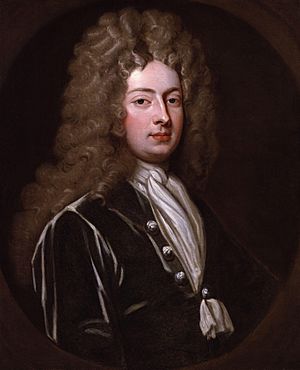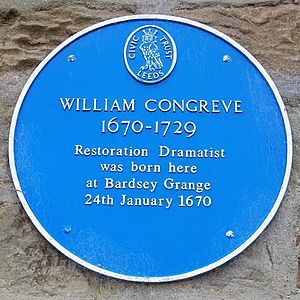William Congreve facts for kids
Quick facts for kids
William Congreve
|
|
|---|---|

1709 portrait of Congreve by Godfrey Kneller
|
|
| Born | 24 January 1670 Bardsey, West Riding of Yorkshire |
| Died | 19 January 1729 (aged 58) London, England |
| Resting place | Westminster Abbey |
| Occupation | Playwright, poet, politician |
| Genre | Restoration literature |
| Literary movement | Classicism |
William Congreve (born January 24, 1670 – died January 19, 1729) was a famous English writer. He wrote plays, poems, and was also a politician. His plays are a big part of what is called Restoration literature. They were known for using satire (making fun of things to show their flaws) and a style called comedy of manners. This style of comedy made fun of the polite society and its rules.
Some of his most famous plays include The Old Bachelor (1693), The Double Dealer (1694), Love for Love (1695), The Mourning Bride (1697), and The Way of the World (1700). William Congreve passed away in London and was buried in a special place called Poets' Corner in Westminster Abbey.
Contents
Early Life and Education
William Congreve was born in a place called Bardsey Grange, near Ledston in Yorkshire, England. His parents were Colonel William Congreve and Mary Browning. When William was young, his family moved to London and then to an Irish port town called Youghal.
He went to school at Kilkenny College in Ireland, where he met another famous writer, Jonathan Swift. Later, he studied at Trinity College Dublin. After his studies, he moved to London to learn law. However, he was much more interested in books, plays, and the lively social scene of the city.
Congreve started writing early. When he was about 17, he published a story called Incognita: or, Love and Duty reconcil'd. He used the pen name Cleophil for this work. This early story helped him become known among other writers. He became a student of the famous poet John Dryden, whom he met at literary gatherings in London. Dryden supported Congreve throughout his life and often wrote nice introductions for his published works.
Becoming a Playwright
William Congreve played a big role in shaping the English comedy of manners. He used clever jokes and well-written conversations to make his plays funny and smart. He became very famous in 1693 for writing some of the most popular plays of the English Restoration period. During this time, it became common for women to play female roles in plays, which was a new and exciting change. One of Congreve's favorite actresses was Mrs. Anne Bracegirdle, who often played the main female characters in his plays.
His first play, The Old Bachelor, was written when he was recovering from an illness. It was performed in 1693 and was a huge hit! It ran for two weeks, and his mentor, John Dryden, praised it a lot. His second play, The Double-Dealer, was not as successful.
By the time he was 30, Congreve had written four comedies. These included Love for Love (1695), which was almost as popular as his first play, and The Way of the World (1700). While The Way of the World was not a hit when it first came out, it is now considered one of his best works and is still performed today. He also wrote one tragedy, The Mourning Bride (1697), which was very popular at the time but is less known now.
After the success of Love for Love, Congreve became a manager for a theater. He also wrote poems for special occasions. Because of his success, he even got a job as a commissioner for licensing hackney coaches (like early taxis!).
Later Life and Legacy
William Congreve's career as a playwright was successful but short. He wrote only five plays between 1693 and 1700. One reason he stopped writing plays was that people's tastes were changing. Also, some people started to worry about whether his comedies were too rude or immoral. A writer named Jeremy Collier wrote a strong criticism of the plays, which upset Congreve.
Even though he stopped writing plays for the stage, Congreve continued to write. He wrote the words for two operas and translated works by other famous writers like Molière. He also became involved in politics as a member of the Whig Kit-Kat Club. In 1714, he even got a political job in Jamaica. During his time there, he focused on writing poetry and translating works by ancient writers like Homer and Horace.
Congreve never married. He was known for his friendships with famous actresses and important women, for whom he often wrote big parts in his plays. These friends included Anne Bracegirdle and Henrietta Godolphin, 2nd Duchess of Marlborough. It is believed that Henrietta's daughter, Mary, was Congreve's child. When he died, he left all his money to the Duchess of Marlborough.
In his later years, Congreve suffered from health problems like gout and cataracts (a problem with the eyes). In late 1728, he was in a carriage accident and never fully recovered. He passed away in London in January 1729 and was buried in Poets' Corner at Westminster Abbey.
Famous Sayings
Two of William Congreve's lines from his play The Mourning Bride (1697) have become very famous. Sometimes people misquote them or think William Shakespeare wrote them!
- "Musick has charms to soothe a savage breast" is the very first line of the play. It means that music can calm even the wildest person. People often say it as "Music hath charms to soothe the savage beast."
- "Heav'n has no rage, like love to hatred turn'd, Nor hell a fury, like a woman scorned." This line means that nothing is as angry as love that turns into hate, or a woman who feels rejected. It's often shortened to "Hell hath no fury like a woman scorned."
Congreve also created another well-known phrase in his play Love for Love (1695):
- "O fie, Miss, you must not kiss and tell." This means you shouldn't share secrets, especially about romantic moments.
Works by William Congreve
- The Old Bachelor (1693)
- The Double Dealer (1694)
- Love for Love (1695)
- The Mourning Bride (1697)
- The Way of the World (1700)
Commemoration
In 2000, the Leeds Civic Trust put up a special blue plaque to honor William Congreve. These plaques are placed on buildings to remember famous people who lived or worked there.
See also
 In Spanish: William Congreve para niños
In Spanish: William Congreve para niños
 | Toni Morrison |
 | Barack Obama |
 | Martin Luther King Jr. |
 | Ralph Bunche |


